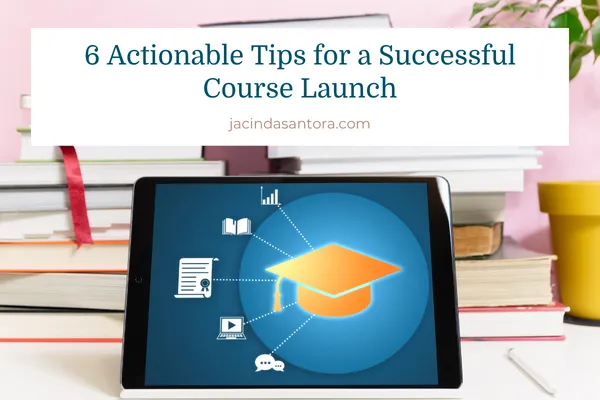



6 Actionable Course Launch Tips for a Successful Launch
When you pour your heart and soul into creating a course, you want it to be successful. Of course you do. And guess what? I want you to be successful, too. That’s why I’ve pulled together these 6 course launch tips for a successful course launch.
Launching a course is complicated. There are so many moving pieces when it comes to even creating your course content, much less everything that goes into marketing it. Do you really want to waste time muddling about with a course that you’re not even sure is going to work?

Having an idea, no matter how great, isn’t enough for success.
If you’re anything like me, you have no shortage of ideas rolling about in your head. Some of them are good, some are bad.
But here’s the thing…
You’re never going to really know which of those ideas are good or bad unless you take the steps to find out.
This can be a difficult process. And, if you’re particularly enamored with an idea, you could spend hours creating content only to find that the idea was a good one only to you. But your target audience doesn’t actually care about the idea.
Whoops.
A better plan? Making sure your idea is one that your ideal audience cares about before you go all in. And that’s where these course launch tips come into play…
6 Tips for a Successful Course Launch
The tips I’m going to share here cover everything from before you create your course (validating your idea) through planning and executing your launch. I won’t be getting into any specific tactics related to course creation — we’re all marketing here, baby!
1. Validate Your Course Idea
If you want to make sure that your course launch is going to be successful, you’ll want to validate your course idea.
Sounds really fancy and complicated, doesn’t it? All it really means is that you’ve tested the idea to see if it meets a need and people will actually buy it.
Sometimes, you might have a great idea, but the market just doesn’t care and doesn’t see a need for it. That doesn’t mean you can do some education and prove the need, but it’s a lot harder to prove the need and market your course than it is to just market your course for which the need or demand is already there.
There are a few relatively easy ways to validate your course idea. Let’s talk about each of them.
Research What’s Already Out There
First, take a look at what’s already out there that’s similar to what you want to offer. Check out online learning providers like Udemy and Skillshare for sure, but don’t forget to look at review sites like Yelp or to check out online communities and forums like Quora, Facebook, and Reddit.
What are you looking for?
Gaps. You’re looking for gaps. Here’s why…
If you’re offering an online course to teach people how to master Instagram marketing, you’ll have a lot of competition. Finding and filling the gaps in existing training is what will make your course stand out.
So, instead of focusing on a broad Instagram marketing course, maybe you focus on something like How to Use Instagram Reels to Grow Your Audience — From Start to Finish.”
Don’t be afraid to niche. If you want, you can always create that “master Instagram marketing” course, but you’ll want to market it by showing what you’re doing to fill the gap.
Pre-Sell Your Course
Another way to validate your course is to pre-sell.
Yep. Sell your course before there’s even a course to sell.

Pre-selling your course is a way to absolutely nail what to offer by understanding what people are willing to pay for in advance. You can even use those who buy-in on your course idea to guide you as you build the course out.
Here’s the thing about pre-selling, though…
I don’t know about you, but I’m probably not going to be buying an idea from someone who doesn’t already have a good reputation and quite a bit of authority on the topic.
It doesn’t mean it won’t work if you’re not already considered an authority in your niche, but it’s something to keep in mind.
Soft Launch Your Course
The third way to validate your course that I’m going to talk about is soft launching. A soft launch is like a beta testing program. Once your course is built, you might offer up a few pared down modules for free or at a steep discount in exchange for feedback. This is also a great way to get some social proof you can use to excite potential students when you do a full launch.
Personally, I don’t recommend that this be used as your sole validation strategy. If you’re going to do a soft launch, make sure you’ve done enough research up front to at least be moderately sure that there’s a market for what you’re doing.
So, maybe combine this with the first validation method I mentioned.
2. Plan Your Launch
Once you’ve validated your course idea, it’s time to plan your launch, from pre-launch through post-launch.
Don’t shy away from the details. Think about everything from when you should open and close your cart to what promotions you should run throughout the entire launch. This includes things like whether or not you’ll run ads and where, how you’ll build your email list (or use your existing list), whether or not you’ll be using social media (and what that strategy will look like), and more.
Your plan is a detailed guide that will take you from creating the course through getting feedback from students to improve the course.
3. Use Copy That Matches Your Brand
There’s no shortage of copywriting templates out there that will help you develop a framework for your launch. But don’t just download someone’s template, update your course details, and run with it.
Your copy has to match your brand. Too often, the templates that are available are so complete that it’s harder to figure out what you need to change than it would be to have a skeleton template that just tells you “talk about the number one benefit of your course here” or “include a list of modules here.”
If your copy is vastly different from your brand, it’s going to be jarring for your customers. They’re going to go from the word choices, tone, and overall vibe from your copy to your course. If they don’t match, that can feel like a breach of trust.
Don’t get me wrong — I’m not opposed to frameworks or templates. I think they can be incredibly helpful for folks who aren’t copywriters to get their courses launched fast. I’ll even go as far as encouraging course creators to write their own copy or use templates during validation (pre-sell and soft launch).
But when you’re ready to get the copy that’s going to command attention from your ideal audience and coach that audience to a conversion, you’re going to want to hire a professional. It doesn’t have to be me, but if you’d like to see if we’re a match, let's talk.
4. Nurture Your Existing Email List
A lot of fuss has been made about social media marketing over the past several years — and with good reason. Social media marketing is incredibly helpful in building relationships and connections with your ideal audience.
However…
Email marketing is still the champ.
Unlike your lists of social media followers, you actually own your email list. You’re not going to log in one day to find that you’ve violated the community standards one too many times and your account has been banned for good (what are you doing to get banned so many times?), taking all of your followers with it.
If you don’t already have an email list, you need to start building one.
If you have a list, you need to nurture those subscribers.
Haven’t messaged them in a year? You’ll need to run a re-engagement campaign to make sure that the people on your list still want to be there.
5. Use Webinars and Other Live Events
Webinars, masterclasses, workshops… even Facebook or Instagram Live events can be a huge sales driver for your course. In these events, you have an engaged audience who is there to hear what you have to say about whatever your topic is.
Your event should be related to your course without giving everything away. And be upfront with your audience about what’s up by letting them know what you’re going to share with them for free in the live event, how they can apply what you’re giving them, and that at the end of the live event you’re going to be talking about your course and giving them a special discount for sticking around.
Let them know that they don’t have to stick around for the sales bit at the end but make your free content engaging, valuable, and actionable enough to make them want to.
Live events, when used to provide value to your ideal audience, are an excellent way to build trust, build authority, and make it easier for people to sign up for your course.
6. Get Social
Don’t ignore social media. I know, I know, I implied earlier that email is better. But social media marketing is important, too.
When you’re ready to launch, you’ll want to update your social media profiles (including cover images) to let your followers know what’s coming. Go live, share engaging promotional content via Reels and Stories.
Most importantly, keep your followers engaged. Don’t just suddenly post a ton of stuff related to your course launch and ignore the content that they started following you for in the first place.
Promotional content should only make up about 20% of your total social media content.
What will you do to make your next course launch your best yet?
As I said, launching an online course is complex. It involves more than just putting together your ideas in a presentation and clicking that big, red “launch” button. Before you invest the time creating a course, make sure you take the time to validate your offer.
From there, it’s simply a matter of making a detailed plan for your launch strategy and sticking with it!
When you’re ready to bring in a consultant to help you hit your next launch revenue goal, I’ve got you covered!
Nothing in on this page or any other site or communication by or from me is a promise of earnings or guarantee of results.
